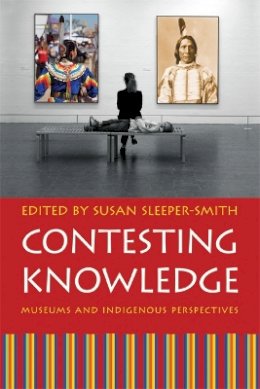
Stock image for illustration purposes only - book cover, edition or condition may vary.
Contesting Knowledge: Museums and Indigenous Perspectives
Susan Sleeper-Smith
€ 46.06
FREE Delivery in Ireland
Description for Contesting Knowledge: Museums and Indigenous Perspectives
Paperback. An interdisciplinary and international collection of essays that illuminates the importance and effects of indigenous perspectives for museums. It challenges and complicates the traditionally close colonialist connections between museums and nation-states and urge more activist and energized roles for museums in the decades ahead. Editor(s): Sleeper-Smith, Susan. Num Pages: 374 pages, 14 photos, 3 maps. BIC Classification: GM; JFSL9; JHMP. Category: (P) Professional & Vocational; (UP) Postgraduate, Research & Scholarly. Dimension: 229 x 155 x 22. Weight in Grams: 510.
This interdisciplinary and international collection of essays illuminates the importance and effects of Indigenous perspectives for museums. The contributors challenge and complicate the traditionally close colonialist connections between museums and nation-states and urge more activist and energized roles for museums in the decades ahead. The essays in section 1 consider ethnography’s influence on how Europeans represent colonized peoples. Section 2 essays analyze curatorial practices, emphasizing how exhibitions must serve diverse masters rather than solely the curator’s own creativity and judgment, a dramatic departure from past museum culture and practice. Section 3 essays consider tribal museums that focus on contesting and critiquing colonial views of American and Canadian history while serving the varied needs of the indigenous communities. The institutions examined in these pages range broadly from the National Museum of the American Indian in Washington DC; the Oneida Nation Museum in Oneida, Wisconsin; tribal museums in the Klamath River region in California; the tribal museum in Zuni, New Mexico; the Museum of the American Indian in New York City; and the District Six Museum in Cape Town, South Africa.
Product Details
Format
Paperback
Publication date
2009
Publisher
University of Nebraska Press United States
Number of pages
374
Condition
New
Number of Pages
374
Place of Publication
Lincoln, United States
ISBN
9780803219489
SKU
V9780803219489
Shipping Time
Usually ships in 7 to 11 working days
Ref
99-1
About Susan Sleeper-Smith
Susan Sleeper-Smith is a professor of history at Michigan State University. She is the author of Indian Women and French Men: Rethinking Cultural Encounter in the Western Great Lakes and the coeditor of New Faces of the Fur Trade: Selected Proceedings of the Seventh North American Fur Trade Conference. Contributors: Kristina Ackley, Miranda J. Brady, M. Teresa Carlson, Brenda J. Child, Brian Isaac Daniels, Gwyneira Isaac, Hal Langfur, Paul Liffman, Amy Lonetree, Brenda Macdougall, Zine Magubane, Ann McMullen, Ciraj Rassool, Jennifer Shannon, Ray Silverman, Susan Sleeper-Smith, and Jacki Thompson Rand
Reviews for Contesting Knowledge: Museums and Indigenous Perspectives
"Regardless of one's ethnicity, affiliation or experience, museum professionals and public historians alike, especially those with little or no experience working with indigenous communities or other stakeholder audiences, will find this volume concerning an emerging aspect of museum practice valuable and worth exploring."—Kym S. Rice, Western American Literature "Contesting Knowledge will likely remain relevant for many years as the issues the authors present are ongoing and applicable to any tribal-centered exhibition or public museum collaboration."—Charles D. Chamberlain III, Ethnohistory "These essays demonstrate that Native peoples across North America and Africa are using museums to rectify a legacy of conquest. As such, scholars and educators in the fields of anthropology, American Indian studies, and museum studies will find this collection of essays especially useful."—Jennifer Fish Kashay, Western Historical Quarterly "This collection is an important part of the conversations taking place in Indigenous studies and beyond."—Elizabeth Archuleta, Studies in American Indian Literatures "This book is valuable because it contains both external and internal synopses of cultural convictions, public history motivations, and organizational conventions which operate to situate an object in its "best position.""—Alphine W. Jefferson, Public Historian
